Key takeaways:
- Economic policies must consider social equity to avoid exacerbating existing inequalities and to uplift all community members.
- Corruption undermines economic growth and public trust by distorting resource allocation and creating barriers for honest businesses.
- Transparency, whistleblower protections, and education on corruption are essential for fostering accountability and rebuilding trust in governance.
- Corruption-infused economic policies lead to disparities that perpetuate social injustice, affecting vulnerable populations the most.
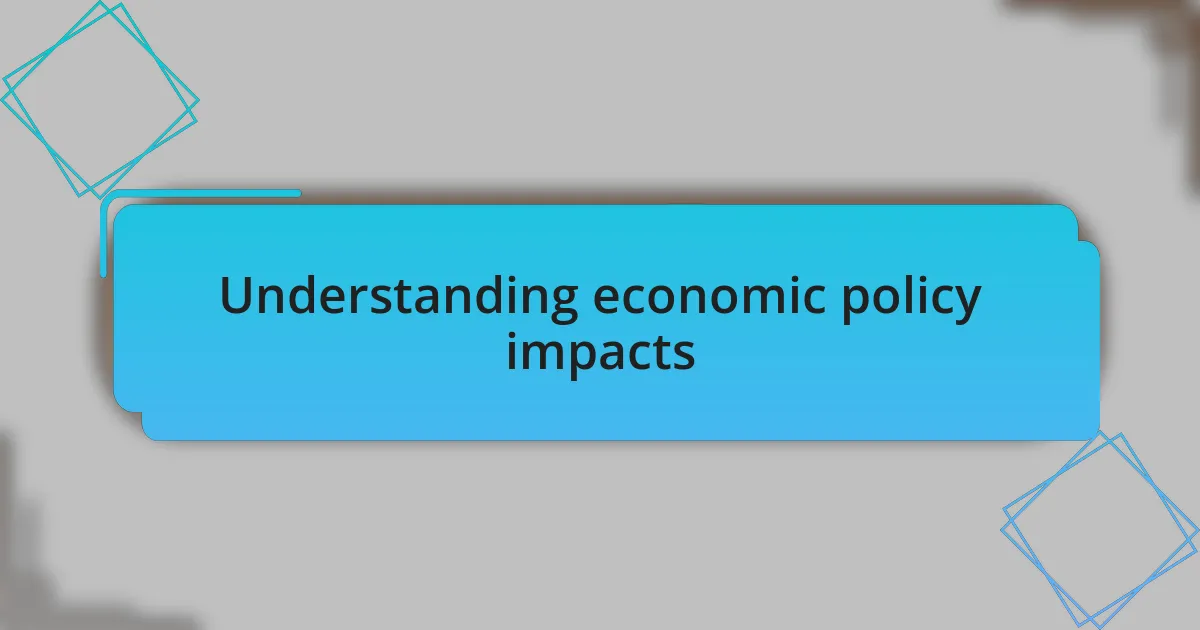
Understanding economic policy impacts
Understanding economic policy impacts requires a deep dive into how decisions resonate across society. I often find myself pondering: how does a single change in policy ripple through communities? For instance, when a government increases taxes to fund healthcare, the immediate effect can be financial strain on families, but the long-term impact could shift societal health outcomes positively.
Reflecting on my experiences, I recall witnessing a small town struggling with unemployment after a factory closure. Local economic policies aimed at attracting new businesses were met with skepticism. Did they truly understand the needs of the affected workers? This scenario illustrates that without considering the population’s unique context, economic policies can miss the mark entirely.
When we analyze economic policy impacts, we should always factor in social equity. I’ve seen firsthand how well-intentioned policies can inadvertently exacerbate existing inequalities. It raises an important question: are we crafting policies that uplift everyone, or just a select few? These reflections highlight the complexity and necessity of understanding the multi-faceted ramifications of economic policy.
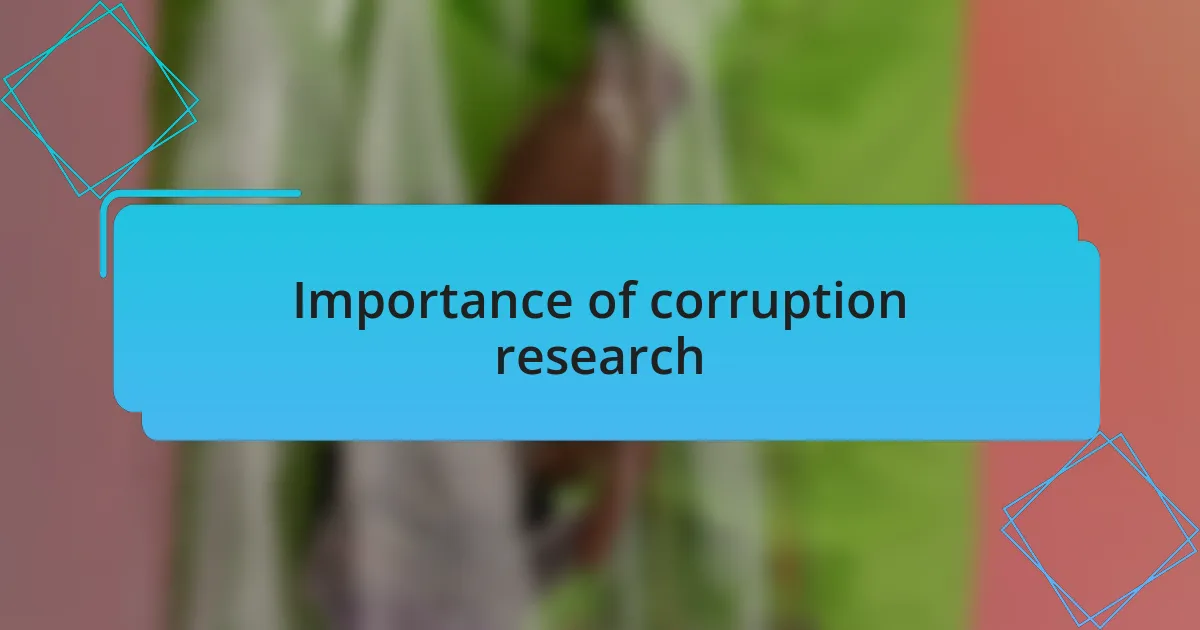
Importance of corruption research
Corruption research is crucial because it sheds light on how dishonest practices undermine economic growth and social justice. I remember attending a community meeting where citizens expressed frustration over misallocated funds intended for public services. It was eye-opening to see how a lack of transparency affected not just infrastructure but also the trust between residents and their local government. What if those funds had been used effectively?
By delving into the nuances of corruption, we gain insights into its far-reaching consequences. For example, I’ve seen how corrupt dealings can skew resource distribution, often favoring the influential while sidelining vulnerable populations. It raises the question: how many potential opportunities are lost when resources are diverted from the people who need them most?
Moreover, examining corruption enables us to advocate for accountability and reform. I once volunteered with an organization that aimed to expose corrupt practices within local councils. Engaging with passionate individuals opened my eyes to the power of collective action. Can one voice truly make a difference, or is it the chorus of many that brings about change? Through research, we can amplify these voices and push for policies that foster integrity rather than deceit.
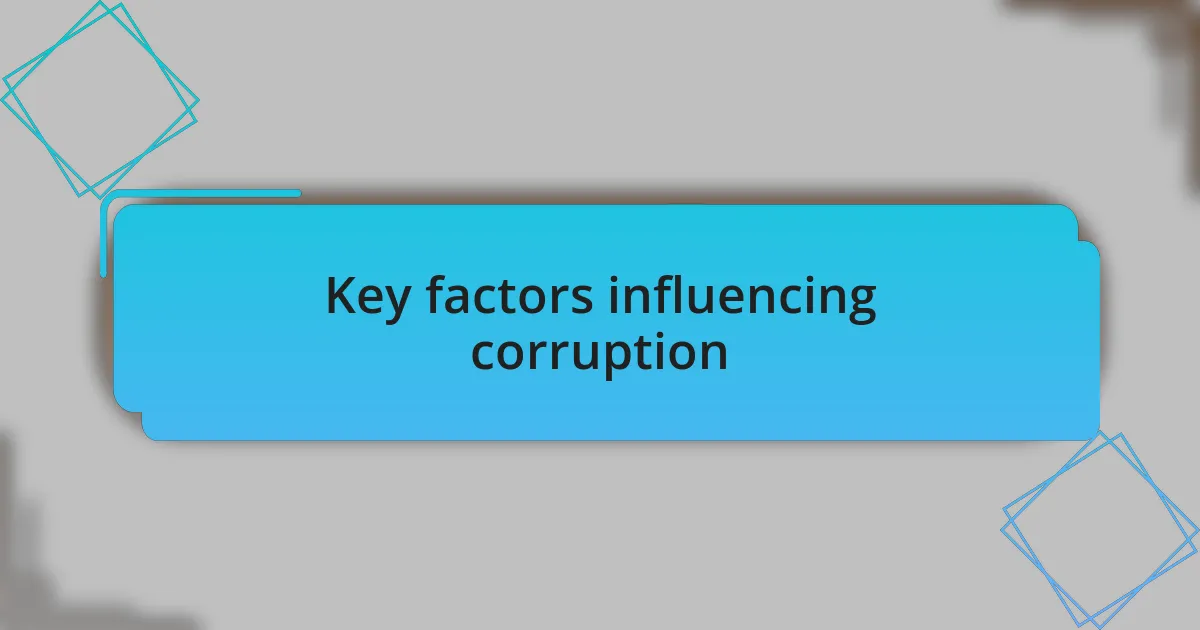
Key factors influencing corruption
One major factor influencing corruption is the lack of effective governance and oversight mechanisms. I remember working in a project where we analyzed local governments struggling with weak regulations. In those environments, opportunities for corrupt practices flourish simply because oversight is minimal. Have you ever noticed how power tends to concentrate in the hands of a few when checks and balances are absent?
Cultural attitudes towards corruption also play a significant role. During a discussion with community leaders, I saw how some individuals viewed small bribes as a necessary means to expedite processes. This mentality creates a slippery slope, where integrity is compromised for convenience. Why is it that some see bribery as just a part of the game rather than a serious ethical breach?
Another crucial factor is economic inequality. When resources are unevenly distributed, I often feel it breeds resentment and a sense of desperation. In a community where wealth is hoarded by a select few, people might resort to corrupt practices as a means of survival. Doesn’t it strike you that where disparity exists, corruption often follows, feeding off the very vulnerabilities it creates?
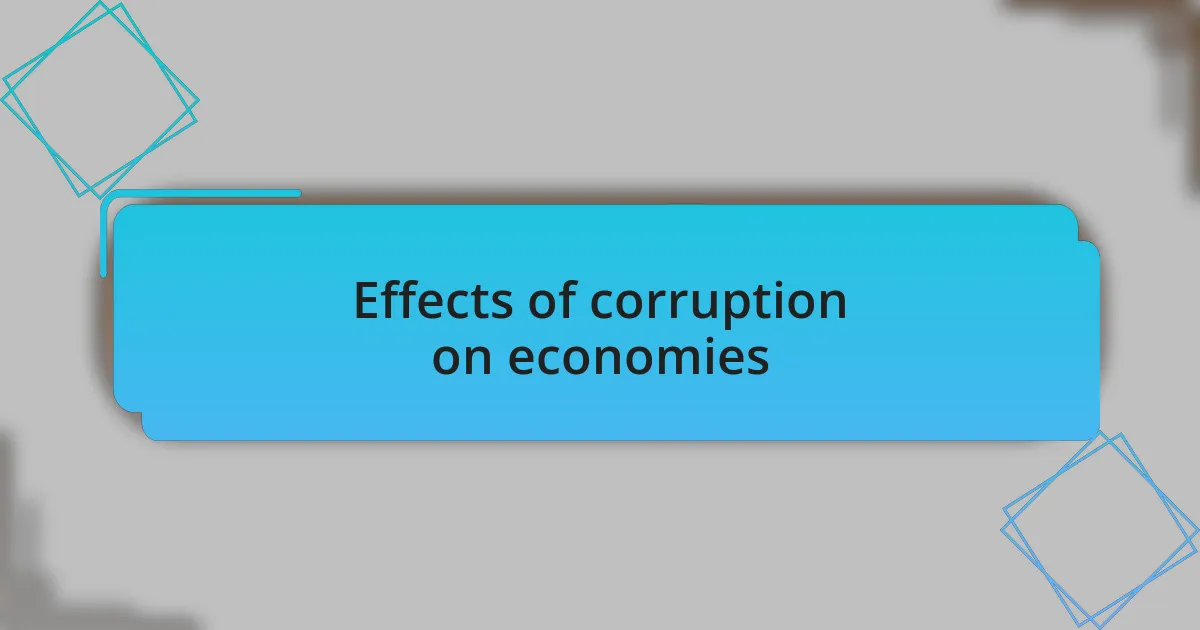
Effects of corruption on economies
Corruption deeply undermines economic growth by distorting market mechanisms. I recall working on an economic development project where we identified that businesses often faced considerable barriers due to bribery and favoritism. It reminded me of the frustration felt by honest entrepreneurs who struggled to compete—how could they thrive in a landscape where integrity took a backseat to shady deals?
Moreover, corruption leads to inefficient resource allocation. In one instance, I witnessed funds meant for public infrastructure diverting into the pockets of corrupt officials. It’s disheartening to think about the roads left unfinished or healthcare services crippled because resources are siphoned away. Have you ever wondered how many potential jobs and opportunities slip through the cracks due to mismanagement and corruption?
Finally, the pervasive nature of corruption can erode public trust in institutions. When citizens see corruption as a norm, I cannot help but think about the broader societal implications. It creates a cycle of disillusionment, where people become disengaged from civic duties. How can we expect active participation in governance when the system appears fundamentally flawed?

Case studies of economic policies
One compelling case study I encountered during my research focused on a country that implemented sweeping economic reforms after a major corruption scandal. The government introduced transparency measures in public contracts, which notably reduced the incidence of bribery. Witnessing the positive shift in business sentiment and the surge of new investments was a powerful reminder of how accountability can restore faith in economic policies.
In another instance, a nation attempted to stimulate its economy through infrastructure development while grappling with entrenched corruption. I remember analyzing the projects that faced significant delays, which were often attributed to corrupt practices among contractors and officials. The emotional toll on citizens waiting for infrastructure improvements was palpable; their frustration was a reflection of deeper systemic issues. Why should a community bear the burden of inefficiency when their tax dollars were at stake?
A particularly striking example I reflect on is one where social programs designed to alleviate poverty were mired in corruption, significantly stunting their effectiveness. I observed firsthand how locals talked about missing out on essential support due to bureaucratic red tape. When policies meant to uplift the underprivileged instead perpetuate inequality, it raises a crucial question: How can we expect genuine economic advancement without eradicating the roots of corruption that sabotage these initiatives?
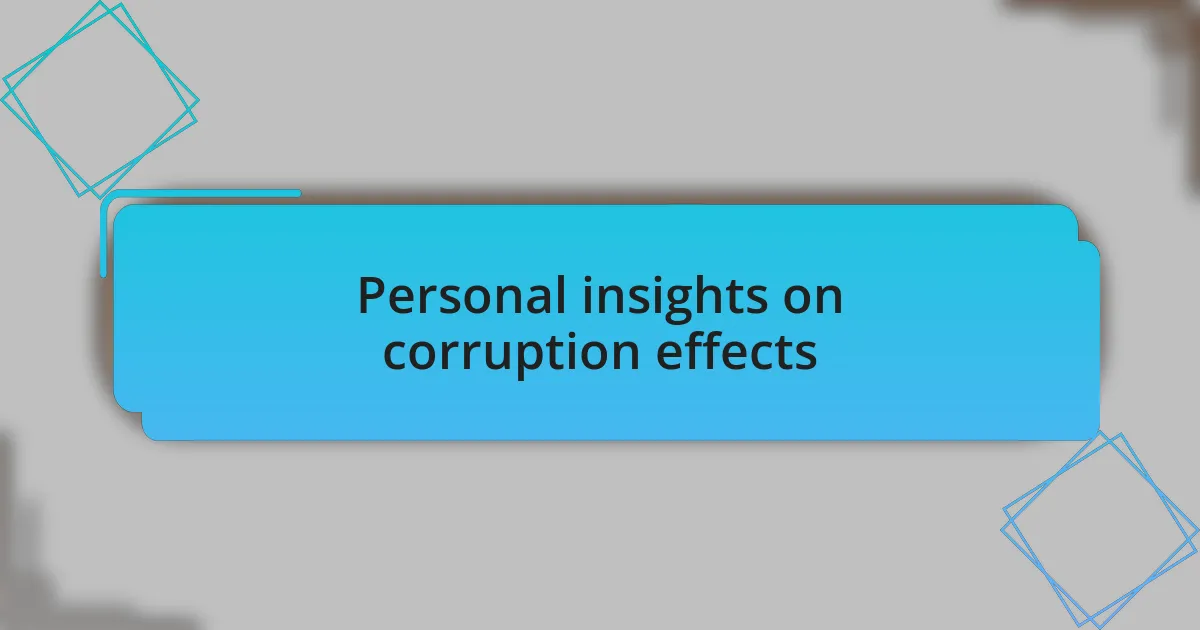
Personal insights on corruption effects
The effects of corruption often extend beyond mere numbers; they seep into the very fabric of society. I recall sitting in a community meeting where residents expressed deep disappointment over resources disappearing into corrupt hands instead of reaching their intended purpose. It’s heartbreaking to think how trust erodes when people feel the system is rigged against them, creating an atmosphere of cynicism.
In my experience, corruption also breeds a culture of fear and silence. One time, I met a local business owner who hesitated to speak out against corrupt practices in his industry. He worried about retaliation rather than seeking justice. This dynamic immobilizes communities and stifles innovation, leaving people to accept a status quo that they know is unfair. Isn’t it tragic to think that fear can suppress voices that are desperate for change?
Moreover, witnessing the disparity between wealthy elites and struggling families due to corrupt economic policies can be quite disheartening. I visited a neighborhood where families barely managed to make ends meet while a few individuals lived in luxury, having thrived under corrupt regimes. This stark contrast highlights the social injustice that corruption perpetuates. How can we expect a future where everyone has equal opportunities if the playing field is so uneven?
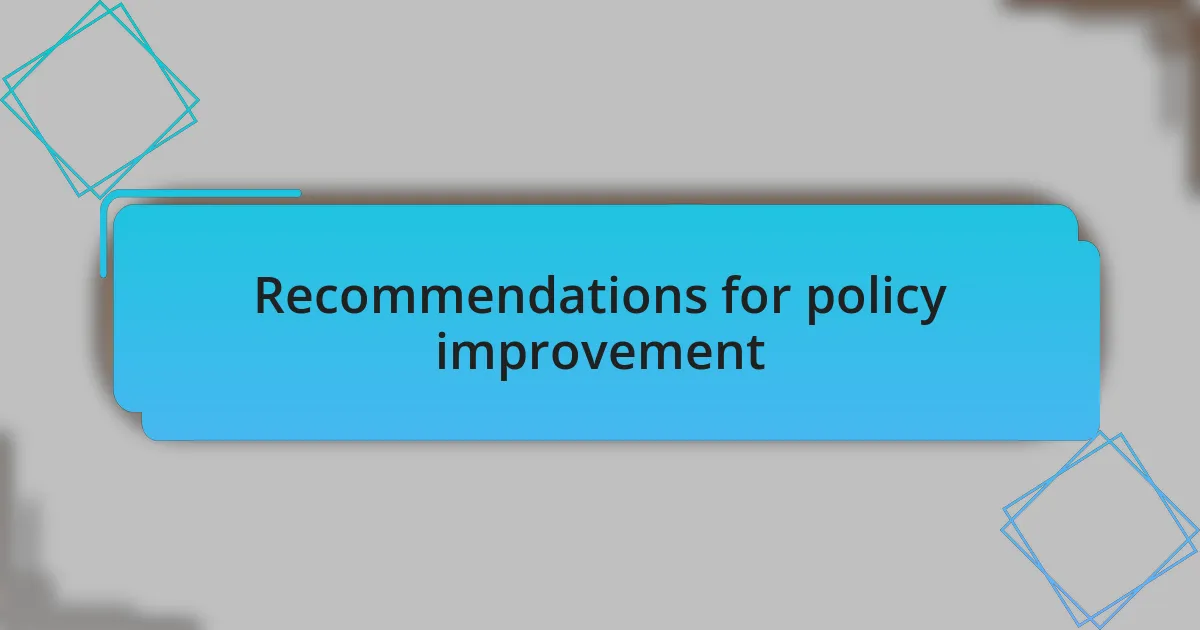
Recommendations for policy improvement
When considering policy improvements, I strongly believe in the importance of transparency in government operations. In my previous work with local NGOs, I’ve seen firsthand how the public can rally around initiatives that promote open data, allowing citizens to track where funds are allocated. Isn’t it empowering when people know that they can hold their leaders accountable? By ensuring that government actions are visible, we can begin to rebuild trust in our institutions.
Another critical recommendation is to strengthen whistleblower protections. In one instance, I learned about a courageous individual who brought attention to corrupt dealings within a major public project. Although the consequences were severe, his actions revealed the importance of safeguarding those who dare to speak out. It’s vital to create an environment where people no longer fear for their safety when they report unethical behavior; how can we foster a culture of integrity if those attempting to do the right thing are left vulnerable?
Lastly, investing in education about corruption and its impacts can create a more informed citizenry. During an outreach program I facilitated, I observed participants engage passionately in discussions about their rights and the necessity of ethical governance. This experience showcased the undeniable potential of an educated population to challenge corrupt practices. Isn’t it essential for communities to understand these concepts deeply so they can advocate for themselves effectively?